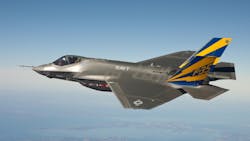Lockheed's Jet Sale to Bahrain Blocked for Human Rights Violations
The Obama administration has told Congress it won’t complete approval for Bahrain to buy as many as 19 F-16 fighter jets from Lockheed Martin Corp. and upgrades for older ones for almost $4 billion until the Gulf ally demonstrates progress on human rights, according to people familiar with the issue.
The declaration of concern, which doesn’t specify what steps Bahrain would have to take, was included in a draft notification of the pending sale that the administration sent to Congress on Wednesday, according to the people who asked not to be identified discussing details of the message that wasn’t released publicly.
The proposed sale to Bahrain is one of three involving fighter jets by Lockheed and Boeing Co. to Persian Gulf allies, according to people familiar with the decision. The initial, informal notifications to Congress say the potential sales include as many as 72 Boeing F-15 jets to Qatar and as many as 32 of the company’s F/A-18 E/F fighters to Kuwait, according to one of the people.
Crackdown on Dissent
While the long-delayed sales would deliver on President Barack Obama’s promise to bolster the defense of Gulf allies worried by U.S. participation in the nuclear deal with their arch-rival Iran, the strings attached to the Bahrain sale in the draft, which could still change, reflect concerns in the administration over that government’s crackdown on dissent and opposition.
Without specifying how much Bahrain must do before the arms sale can move forward, the Obama administration is calling on its rulers to reverse its moves suppressing nonviolent opposition and dissolving the al-Wefaq political society, the main opposition group of the country’s Shiite majority, according to an administration official who spoke on condition of anonymity. The administration is also concerned by continuing legal actions against Sheikh Issa Qassim, al-Wefaq’s leader, and the detention of human-rights activist Nabeel Rajab, the official said.
Secretary of State John Kerry has previously condemned the decision to dissolve al-Wefaq, saying the government’s efforts to suppress nonviolent opposition undermine Bahrain’s cohesion and security. The Arab nation hosts the U.S. Navy’s 5th Fleet in the Persian Gulf.
Bahrain’s embassy in Washington said in a statement Friday hat the kingdom “has continuously taken extensive social, political, economic and judicial reform measures and is committed to continue its reform plans,” which it said are often downplayed. It said Bahrain “is highly concerned with the manner the Foreign Military Sales case has been politicized,” and “the government will not tolerate those exploiting sectarian rifts, either domestically or regionally.”
An aide to Senate Foreign Relations Committee Chairman Bob Corker of Tennessee said the conditions proposed for the Bahrain deal will be evaluated by the panel as part of its review of the planned sale.
Review Timetable
The arms sales notifications sent to lawmakers this week begin an informal review to take as long as 40 days. That would be followed by an official, public notification, after which the deals would go through unless Congress moves to stop them within 30 days.
In addition to the 19 new F-16s valued at as much as $2.8 billion, the sale to Bahrain would include upgrades costing as much as $1 billion to Bahrain’s existing F-16 fleet, according to the informal notification.
Unlike Bahrain, the planned sales for Qatar and Kuwait are being proposed without conditions.
“Anytime there are strings attached, countries are less likely to complete a deal,” said Loren Thompson, a defense analyst with the Arlington, Virginia-based Lexington Institute who also consults for Lockheed, said in an e-mail.
Older Planes
“If Bahrain goes elsewhere for its fighters, that would destroy U.S. jobs and undermine U.S. influence in the region,” said Thompson, who indicated he was aware in general terms of the administration’s conditions.
Concerns on issues such as human rights are normally taken into account in deciding whether to sell arms to a country, not included as a condition in notifying Congress, said Joel Johnson, an analyst who follows foreign military sales for the Teal Group in Fairfax, Virginia.
The arms sales to the Gulf allies will help the U.S. contractors keep assembly lines running for their older fighters as U.S. purchases shift to Lockheed’s new F-35.
“This order is very important to Lockheed Martin,” Michael Rein, a spokesman for the Bethesda, Maryland-based contractor, said in an e-mail. “We have been aggressively pursuing additional F-16 orders and without this sale to Bahrain we run the very real risk of the F-16 line shutting down. Bahrain is a valued customer and key partner.”
About the Author
Bloomberg
Licensed content from Bloomberg, copyright 2016.
